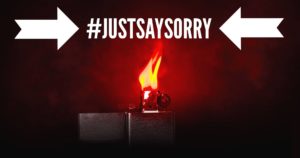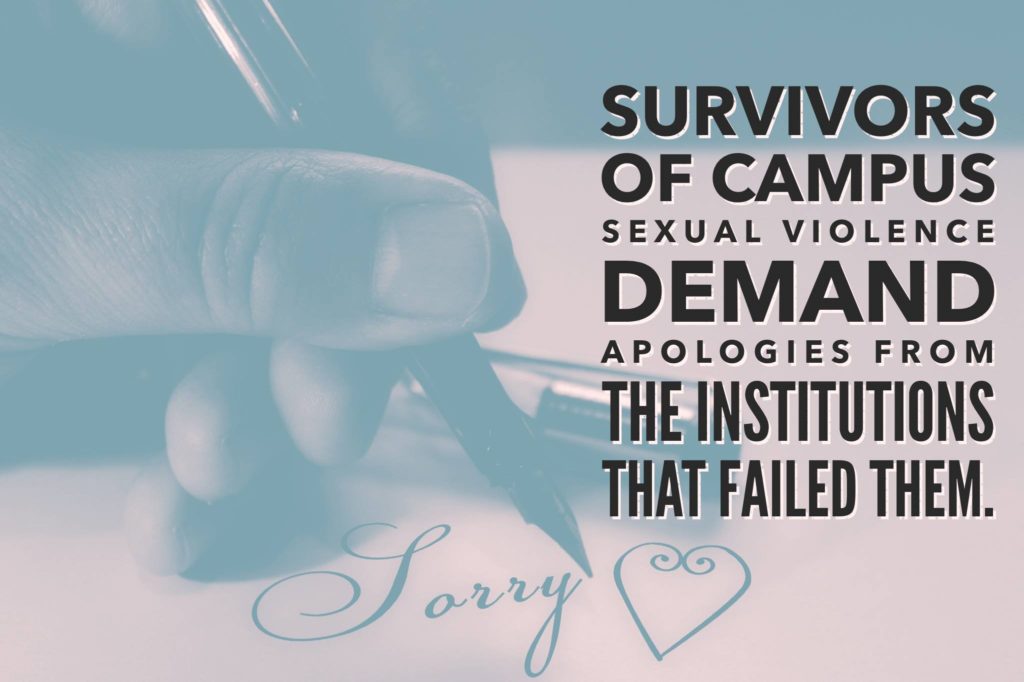By LB Klein, former SSH Blog Correspondent

There is a joyful moment during which applicants to institutions of higher education turn into admitted students. This moment is perhaps best captured by students sporting newly-acquired campus swag such as a sweatshirt in official colors with the campus name emblazoned on the front or a t-shirt with a mascot. However, for survivors of sexual assault on many campuses who felt their schools did not support them, these coveted items quickly become a tangible reminder of a dream promised and nightmare delivered. To capture the hollowness of institutional betrayal, Wagatwe Wanjuki and Kamilah Willingham, two prominent Black feminist survivor activists and founders of Survivors Eradicating Rape Culture, are literally setting these items on fire.
Willingham and Wanjuki are burning their once-prized possessions and asking for other survivors to do the same until their alma maters do what they see as the bare minimum: acknowledge their experiences by apologizing. Through this #JustSaySorry campaign Survivors Eradicating Rape Culture is asking for “public acknowledgements of past failures” to “restore a sense of trust in the school’s intention and ability to approach campus gendered violence with integrity.” They argue that this action is simple but would have a huge impact on survivors who often feel their campuses see them as numbers in a crime statistics report and not treasured students or alumni who deserve restoration.
 A few years have passed since Wanjuki and Wilingham were sexually assaulted while students at Tufts University and Harvard Law School respectively, they discuss the long-range impact of institutional betrayal. In a recent article she penned for The Establishment, Willingham mentions the “PTSD and a six-figure student debt amount” that linger, while her pride in her Harvard Law School attendance have faded. Much like movements to address street harassment, #JustSaySorry uses a grassroots and community approach to ask institutions to move beyond the often clinical official statements often issued by college and universities. #JustSaySorry is calling for acknowledgment of survivors as people and to consider the human impact of sexual violence and its aftermath when handled poorly.
A few years have passed since Wanjuki and Wilingham were sexually assaulted while students at Tufts University and Harvard Law School respectively, they discuss the long-range impact of institutional betrayal. In a recent article she penned for The Establishment, Willingham mentions the “PTSD and a six-figure student debt amount” that linger, while her pride in her Harvard Law School attendance have faded. Much like movements to address street harassment, #JustSaySorry uses a grassroots and community approach to ask institutions to move beyond the often clinical official statements often issued by college and universities. #JustSaySorry is calling for acknowledgment of survivors as people and to consider the human impact of sexual violence and its aftermath when handled poorly.
Survivors Eradicating Rape Culture and the #JustSaySorry campaign come at a time during which there is increased attention to the issue of sexual violence on campuses, but the road to accountability can be a long and fruitless one for survivors. No matter how well we enhance our university systems (and we should) we are in need of more than just more laws and more policies. Our processes for holding institutions accountable for the harm they have caused survivors frequently mirror the failings of systems of perpetrator accountability.
 Wanjuki and Willingham are reminding us through their deeply personal and cathartic actions that genuine apologizing is a rare, critical, and distressingly radical act for administrators and institutions. Survivors Ending Rape Culture is calling on survivors to send them items from alma maters who failed them or to post videos or photos of themselves withholding their donations to their institutions.
Wanjuki and Willingham are reminding us through their deeply personal and cathartic actions that genuine apologizing is a rare, critical, and distressingly radical act for administrators and institutions. Survivors Ending Rape Culture is calling on survivors to send them items from alma maters who failed them or to post videos or photos of themselves withholding their donations to their institutions.
Anyone can show solidarity for their work by using the hashtag #JustSaySorry to call out institutions that have caused survivors harm or by tuning into their live broadcasts of burning protests. To create more survivor supportive cultures, we cannot rely solely on strengthening formal systems. As Willingham and Wanjuki are demonstrating, we must also recognize the powerful role that the people who make up institutions and communities have to help survivors heal.
LB Klein, MSW, MPA has dedicated her professional and academic life to ending gender-based violence, supporting survivors, and advancing social justice. She is a doctoral fellow in the University of North Carolina at Chapel Hill’s School of Social Work and serves a lead trainer and curriculum development specialist for the Prevention Innovations Research Center at the University of New Hampshire.
